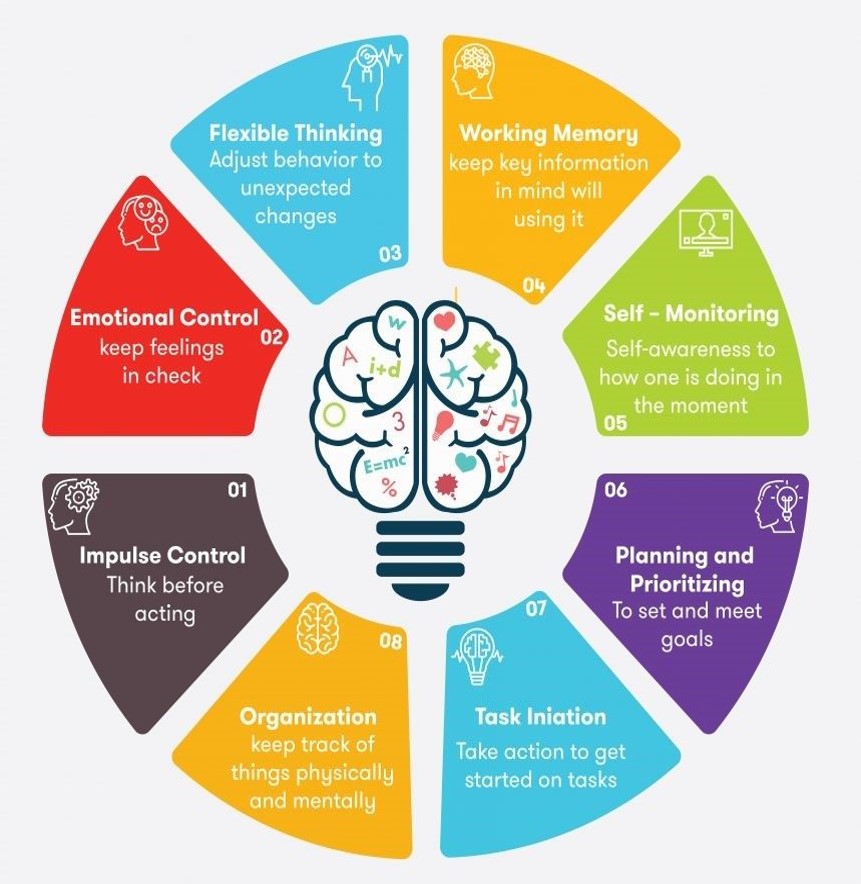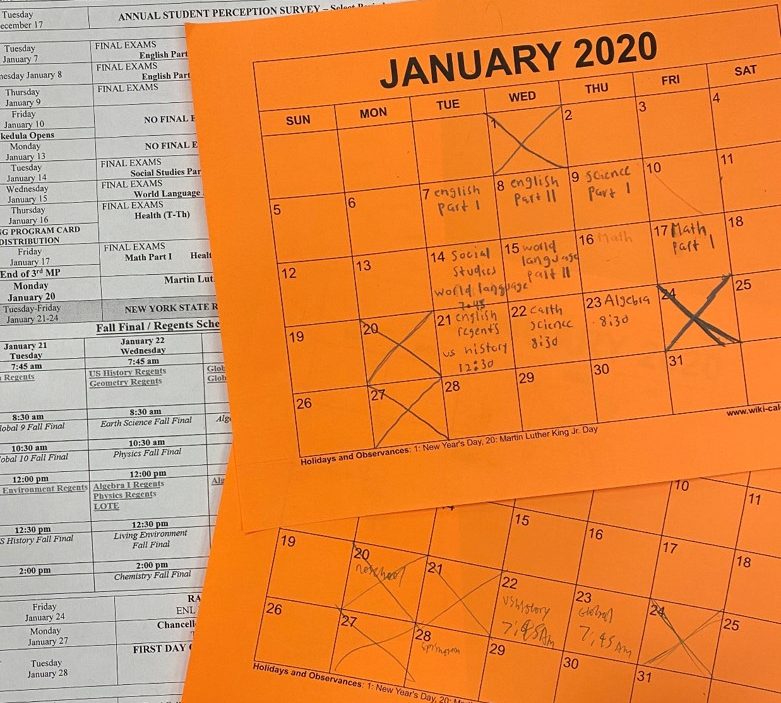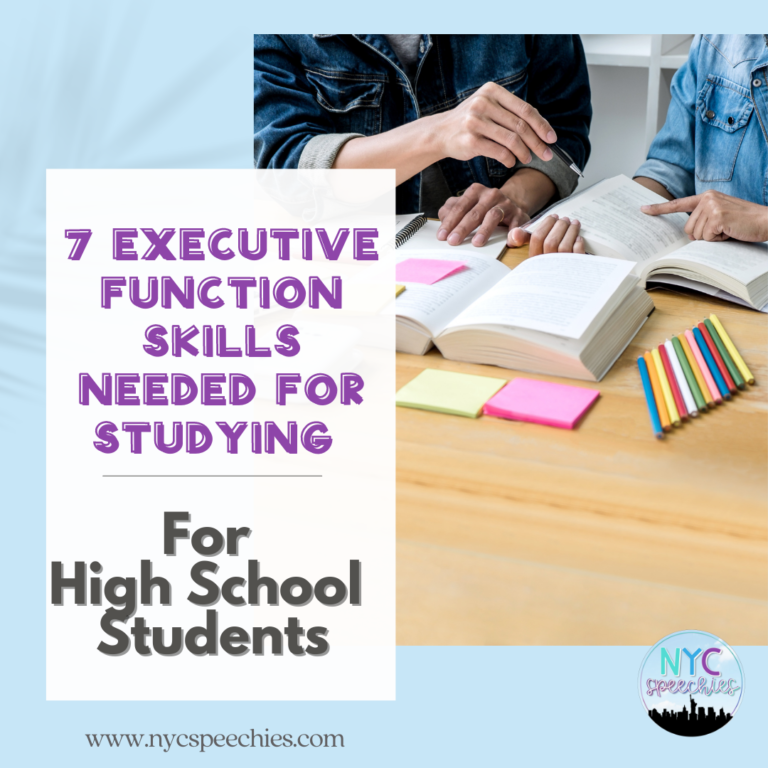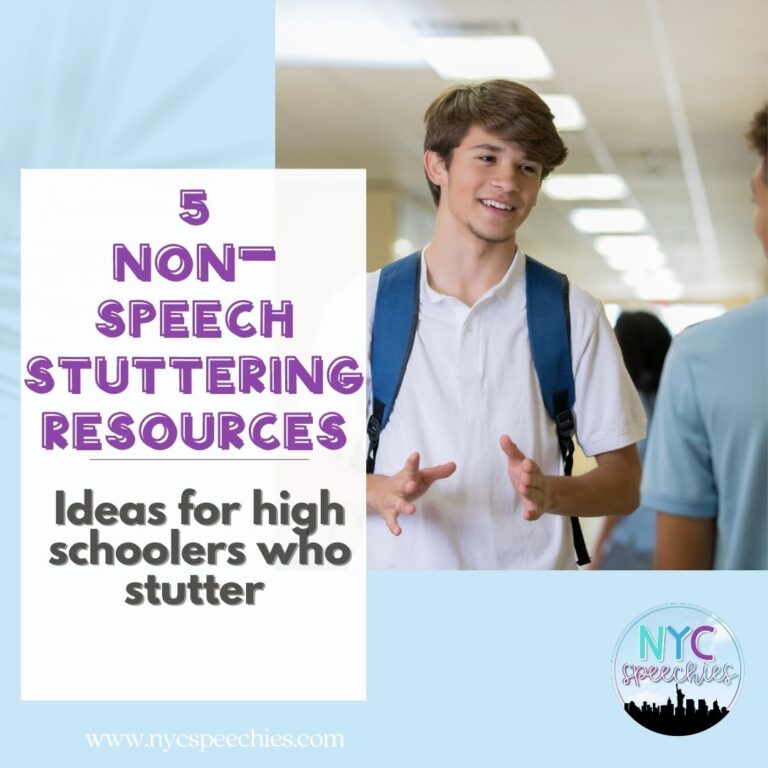Executive Functioning Strategies for High School Students

Midterm and Finals week is dreaded by high school students everywhere. For many of our students with speech and language learning disorders, finals week brings about even more stress. Many of our students are overwhelmed by just the sheer number of tests they are required to take. Some are re-taking state exams and feel pressure to pass in order to receive their diploma. Other students can’t even remember which finals they have, how many, or what days they are on. And, for the large majority of our students, many confess that they don’t even know how to study.
So…how can we help?
As SLP’s, we have the unique opportunity to craft our therapy to fit our student’s individual needs. For many of our students with speech and language disorders, midterms/finals week exposes their difficulties with executive functions. Executive functions (EF) are complex cognitive control mechanisms that allow for goal-oriented behavior, and include updating working memory, cognitive flexibility, inhibition of irrelevant information, and self-control (Miyake et al., 2000). During the end of the semester, students are bombarded with final exams, projects, state tests, final papers, etc. There is growing evidence that EFs continue to develop through late adolescence and into adulthood. In high school, students learn to “make plans, discuss, evaluate ideas, participate in groups, reflect on their work, change their minds, and rewrite their papers.” The complexity of these communication tasks and the expectation that they will be completed independently increase substantially.
Executive Functions Include:
- Planning- selecting a goal
- Persistence toward a goal- capacity to maintain drive to follow through to completion, capacity to inhibit responding to distractions mid-task
- Organizing- arranging sequence of steps to meet goal
- Working Memory & Recall -holding plans/steps in mind while acting, remembering, thinking forwards and backwards
- Time management-awareness of time, setting priorities, acknowledgement of deadlines
- Response inhibition-thinking before you act, managing impulses
- Emotional Control- management of emotions
- Metacognition/Monitoring-self-monitoring/evaluation
- Sustained Attention- sustaining attention over time despite competing distractors or lack of interest
- Task initiation/activation- ability to start a series of behaviors
- Flexibility/shifting– shifting attention and mental set, changing of cognition/behavior as needed, ability to see problems from different viewpoints
It is evident that many EF’s play a role when it comes to finals week for high schoolers. They are expected to organize a semester’s worth of notes, plan a study schedule, manage their time to study each night, maintain attention, set goals for themselves, prioritize projects amongst tests…the list goes on. We have compiled a list of the most effective ways we have found to help students improve their EF skills during midterm/finals week. For even more helpful resources, check out our Executive Function Activities Packet .

Organization Tips:
- Calendar: Help your students fill in a calendar with important dates so they know when all of their finals are. Often times, the students will receive a notice of finals dates and they have a hard time sorting through what is pertinent to them. We spend a session helping our students fill in a calendar with their specific testing schedule and times so they see everything visually.
- Time management: Use the above mentioned calendar to help create a study schedule for each student. Discuss what tests are going to be harder for them and thus require more study time. Use our daily afternoon schedule from our packet to help your students map out their afternoons and manage their study time.
- Prioritize: Help your students prioritize their tests. Discuss which tests are going to be weighted heavier and will have a more substantial effect on their grades. Helping your students identify the important subjects to study will help them feel less overwhelmed. Use our Daily To-Do list to help your students create to-do lists with their prioritized studying/projects at the top.
Study Skills:
You’d be surprised how many students say they don’t know HOW to study. Some of our sessions are spent helping students understand that studying is more than just re-reading their notes. For many students, they have a hard time realizing this. It is up to us to help show them that studying can be summarizing/paraphrasing notes, using definitions to create synonyms and antonyms, and practicing their skills by taking advantage of practice questions.
- Index cards: Many students haven’t used index cards and don’t understand how to create flashcards. Flashcards can be used for definitions, synonyms, antonyms, lists, categories, questions, etc. Spending a session helping your students start creating flash cards can be a wonderful way to support their vocabulary skills while providing them with a super helpful study tool!
- Study sheet: Help your students create their own study guide and work on summarizing skills. They can do this in many ways, as we are sure we all spent hours creating different types of these in grad school! In our packet, we provide a template of one way to create a study guide that we find to be very straightforward. Check it out here.
- Practice questions: One of the most effective study techniques is practice testing. If your students are taking New York State Regents, you can help them access past regents exams which they can print for practice questions. You can also direct them to websites like Quizlet, Cram, or Brainscape . Some have flashcards already made and practice questions to help students study for any subject. Explain to students that this step should come last in their studying repertoire, as we would suggest they have a clear understanding of the topics before completing practice exams and questions.
- Watch a video about study skills with your students: There are tons of study skills videos on YouTube. Check out a few we show our students to give them some additional ideas for studying.
Helpful Apps:
- Reminders – teach your students to use the free apps on their phones to remind them to study for different tests.
- Timer for studying – the timer app is a great way to manage time. Help your students understand the timer can be useful for setting time goals for different subjects and then moving on to a different topic/subject.
- Google calendar – use the calendar to set schedules, goals, and reminders for tests.
- Remember the Milk is an online to-do list app that will work similarly to the reminder app already on iphones. Students can decide how they want to be reminded, choosing from emails, texts, messenger,Twitter, etc.
- To Do-Ist is another app that will help students create to-do lists in categories of importance, subtasks, and create favorites.

De-stressing Tips:
So many of our students are just so overwhelmed during this extremely stressful time in their school year. Help them understand that there are ways to self-monitor and control their emotions and stress. Providing students with tools to de-stress will be a valuable life skill as they continue through their lives and into college.
- Take a break – help your students understand that breaks are ok and necessary to manage stress. They can walk around the block, stretch their bodies, or veg out in front of the tv for 20 minutes to help themselves reset their brains.
- Breathing exercises – deep breathing is an excellent way for students to re-group in the midst of a stressful studying night. Teach them how to take deep, full breaths, inhales and exhales lasting for at least 5 seconds each. Have them do this 10 times for every hour that they study. You’ll be pleased to hear how beneficial this can be for some students.
- Positive affirmations – positive thinking is a tool that can help us all, but especially our students who struggle in school. They are caught in a loop of failure, and for some, they set their expectations low because school is simply too hard. Teach your students how to frame their thinking in order to control their emotions and actions. By starting to think more positively, our students can learn to believe in themselves and realize they have the ability to pass their classes. The internet is full of positive affirmation lists. Help your students identify which they feel can benefit them and print them out. Have them say these phrases a few times every morning to start their day in a positive way!
Don’t forget to check out our Executive Function Packet for even more ideas!
How do you help your students prepare for big tests? We would love to read your ideas in the comments 🙂






